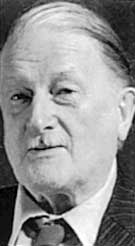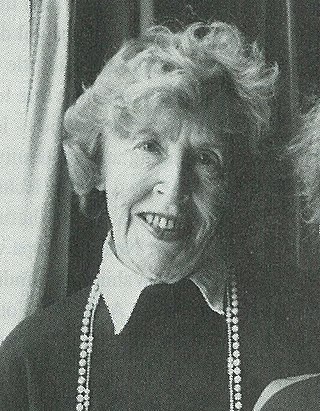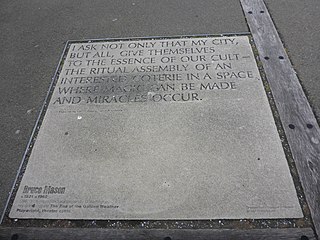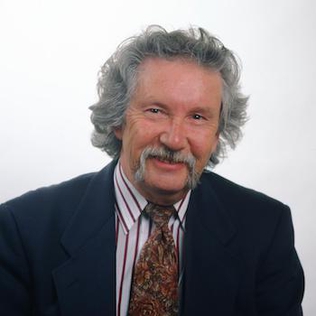
Sir Ronald Syme, was a New Zealand-born historian and classicist. He was regarded as the greatest historian of ancient Rome since Theodor Mommsen and the most brilliant exponent of the history of the Roman Empire since Edward Gibbon. His great work was The Roman Revolution (1939), a masterly and controversial analysis of Roman political life in the period following the assassination of Julius Caesar.
New Zealand literature is literature, both oral and written, produced by the people of New Zealand. It often deals with New Zealand themes, people or places, is written predominantly in New Zealand English, and features Māori culture and the use of the Māori language. Before the arrival and settlement of Europeans in New Zealand in the 19th century, Māori culture had a strong oral tradition. Early European settlers wrote about their experiences travelling and exploring New Zealand. The concept of a "New Zealand literature", as distinct from English literature, did not originate until the 20th century, when authors began exploring themes of landscape, isolation, and the emerging New Zealand national identity. Māori writers became more prominent in the latter half of the 20th century, and Māori language and culture have become an increasingly important part of New Zealand literature.

The Most Excellent Order of the British Empire is a British order of chivalry, rewarding contributions to the arts and sciences, work with charitable and welfare organisations, and public service outside the civil service. It was established on 4 June 1917 by King George V and comprises five classes across both civil and military divisions, the most senior two of which make the recipient either a knight if male or dame if female. There is also the related British Empire Medal, whose recipients are affiliated with, but not members of, the order.

The Usher of the Black Rod is an official in the parliaments of several countries of the Commonwealth of Nations. The position originates in the House of Lords of the Parliament of the United Kingdom. Equivalent positions also exist in Australia, Canada, and New Zealand.

The Coral Island: A Tale of the Pacific Ocean (1857) is a novel written by Scottish author R. M. Ballantyne. One of the first works of juvenile fiction to feature exclusively juvenile heroes, the story relates the adventures of three boys marooned on a South Pacific island, the only survivors of a shipwreck.

Lauris Dorothy Edmond was a New Zealand poet and writer.

Dame Claudia Josepha Orange is a New Zealand historian best known for her 1987 book The Treaty of Waitangi, which won 'Book of the Year' at the Goodman Fielder Wattie Book Award in 1988.

Eduard Christian Arning was an English-German dermatologist and microbiologist from Manchester.

Bruce Edward George Mason was a significant playwright in New Zealand who wrote 34 plays and influenced the cultural landscape of the country through his contribution to theatre. In 1980, he was appointed a Commander of the Order of the British Empire. The Bruce Mason Playwriting Award, one of the most important playwrighting accolades in New Zealand, is named in his honour. Mason was also an actor, critic, and fiction writer.

The Western world, also known as the West, primarily refers to various nations and states in the regions of Australasia, Europe, and the Americas. The Western world likewise is called the Occident in contrast to the Eastern world known as the Orient. The West is considered an evolving concept; made up of cultural, political, and economic synergy among diverse groups of people, and not a rigid region with fixed borders and members. Definitions for "Western world" vary according to context and perspectives.
Martin Edmond is a New Zealand author and screenplay writer. He is the son of writer Lauris Edmond.
Anthony John Ballantyne is a New Zealand historian at the University of Otago, Dunedin, New Zealand. After completing his schooling at King's High School, Dunedin, he graduated BA at the University of Otago, Dunedin and obtained a PhD at the University of Cambridge. After stints abroad, he returned to the University of Otago, Dunedin, where his career advanced.
Fiona Farrell is a New Zealand poet, fiction and non-fiction writer and playwright.
Philip Anthony Clairmont (1949–1984) was a New Zealand painter.
Alexander Hare McLintock was a New Zealand teacher, university lecturer, historian and artist. He edited and authored the three-volume Encyclopaedia of New Zealand, published in 1966, his final and perhaps his most remembered work.

Charlotte Jean Macdonald, is a New Zealand historian. After studying as an undergraduate at Massey University, she earned her PhD from University of Auckland and is now a professor at Victoria University of Wellington.
The 1828 Proclamation of Demarcation was issued by George Arthur, governor of Tasmania, and ordered the white colonial populations and Tasmanian Aboriginal populations be temporarily separated from each other. Arthur clarified that the proclamation would not limit Aboriginals from traveling through Tasmania to shellfish hunting territories, provided a passport was coordinated with their leaders. The proclamation was justified as protecting Aboriginals from violence from colonists, and to protect the colonists from "repeated and wanton barbarous murders and other crimes" by the Aboriginals.

Michael Harlow is a poet, publisher, editor and librettist. A recipient of the Katherine Mansfield Menton Fellowship (1986) and the University of Otago Robert Burns Fellowship (2009), he has twice been a poetry finalist in the New Zealand Book Awards. In 2018 he was awarded the Prime Minister's Award for Literary Achievement, alongside playwright Renée and critic and curator Wystan Curnow Harlow has published 12 books of poetry and one book on writing poetry.
Savage Civilisation by Tom Harrisson was published in January 1937 by Victor Gollancz. The book is a mixture of history, ethnographical account and travel narrative, set in the New Hebrides. Harrisson’s biographer, Judith Heimann, describes it as one of the “few works of scholarship in the social sciences to have survived so well the sixty-odd years” since its publication.

Rodney John Charles Preece was a British-Canadian political philosopher and historian of animal rights and vegetarianism. He was professor emeritus in the Department of Political Science at Wilfrid Laurier University. Preece authored and edited 19 books on topics including animal rights and welfare, vegetarianism, German politics, socialization in Europe, and political theory.











